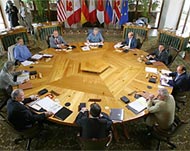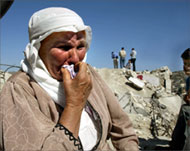US scholars doubt Iraq invasion wisdom
Several prominent US scholars of international relations who believe that Arab-Muslim societies are primed for political change, say the situation in Iraq has diminished Washington’s ability to advance the reform process.

At the G8 summit meeting last month in Sea Island, Georgia, President George W Bush reiterated his belief that US actions in Iraq would transform that country into “a free, democratic, federal Iraq, a country that is a source of stability to the Middle East”.
But that belief is not shared by many analysts in prominent Washington thinktanks, who feel that the experience of Iraq has been detrimental in at least two clear ways to the cause of spreading democracy in the region.
In the immediate term, several Middle East analysts say the ongoing violence and insecurity, coupled with the Abu Ghraib prison abuse scandal, have damaged US credibility in the eyes of the Arab-Muslim world, despite the 28 June transfer of sovereignty to an Iraqi interim government.
As Delinda Hanley, news editor of the Washington Report on Middle East Affairs, a monthly magazine, says, “The Abu Ghraib thing is the worst thing that ever happened to our public diplomacy.”
 |
|
Bush said a ‘free Iraq’ would be a |
Over the longer term, certain countries may be tempted to crack down on free speech and open dissent out of fear that they could be next in line for regime change.
“Certainly this idea that the war in Iraq was going to further democracy is completely ridiculous,” says Anatol Lieven, a senior associate at the Carnegie Endowment for International Peace.
“Regimes which see themselves under serious threat of international attack are likely to be more authoritarian, not less.”
Credibility hurt
Many thinktank scholars maintain that the Middle East is ripe for political and economic reforms in the coming years, but add that the challenges remain daunting.
One of them, Nathan Brown, a professor of political science and international affairs at George Washington University, says he is “reasonably optimistic” about the long-term prospects for democracy in the Middle East.
“There has been a sea change in the way people [in the Middle East] see their own societies,” Brown says.
However, he cautions: “There is no doubt about the fact that America’s credibility in the region is at an abysmal, historical low right now. So the United States is really not going to be able to do that much.”
According to Carnegie Endowment’s Lieven, the growing perception that the US is pursuing hardline policies toward Iran and Syria, while taking an increasingly pro-Israel stance in the Middle East peace process, has created so much anti-American “hostility” that the US can no longer have a positive impact on reform efforts in that part of the world.
|
“There is no doubt about the fact that America’s credibility in the region is at an abysmal, historical low right now” Nathan Brown, |
“That makes it impossible for the US to play a serious role in encouraging democracy in the region,” he says.
Some experts and diplomats say the Israeli-Palestinian peace process lies at the heart of democracy efforts, while others argue that certain Arab governments opposed to reform use the conflict as a stalling tactic.
There is a consensus, however, that a resolution to the conflict deemed equitable to both Israelis and Palestinians would greatly enhance US diplomatic influence in the reform movement.
As George Washington University’s Brown says, “If the United States wants to encourage democracy in the region, it cannot really do so in the absence of a credible peace process.”
Room to talk
But that raises the inevitable question about the limits of US influence. Tamara Wittes, a research fellow at the Saban Center for Middle East Policy at the Brookings Institution, says the US has too large a presence in the region not to have some influence over its political evolution.
 |
|
US credibility was dented by the |
“The US is inevitably going to affect the developments in that region. The question is what direction is that intervention going to take,” she said.
In Wittes’ opinion, regardless of what some view as the US credibility gap in the Arab-Muslim world, Bush’s public comments on his vision for democracy in the Middle East could help further internal discussions on the desire for reform.
“The fact that President Bush has been standing up talking about Arab reform has given some of them, Arab reformers, greater room to talk,” she says.
Others beg to differ. Indeed, some US foreign-policy scholars are doubtful that US rhetoric on Middle East democracy will have any real impact on internal reform movements already under way.
“I really don’t think that the prime minister of Britain and the president of the United States talking about the need for Arab reform, is going to have any effect,” Lieven says.
Unavoidable topic
Hanley of the Washington Report on Middle East Affairs agrees, saying that, in some cases, the US has made things more difficult for Arab pro-democracy groups by going public with its vision for political change in the region.
|
“The fact that President Bush has been standing up talking about Arab reform has given some of them, Arab reformers, greater room to talk” Tamara Wittes, |
“When it’s perceived as a pro-American stance, it hurts the reformers,” she says.
Clearly, views on the wisdom of Washington’s pro-democracy drive vary widely. But Samer Shehata, a professor of contemporary Arab studies at Georgetown University, takes a more nuanced approach.
While most Arab governments reject what they view as “condescending” public calls from the Bush administration for democracy and greater political freedom, they are no longer able to avoid discussions on the subject.
“Even though Arabs generally dismiss the United States, the very fact that there is talk and concentration in Washington on these issues makes it almost impossible not to talk about these issues in the Arab world,” he says.
In general, critics of the Bush administration says discussions on democracy have been unfolding in the Arab-Muslim world for many years, and that political change cannot be dictated by outside influences.
At the Arab League’s annual summit meeting in May, Arab leaders issued a lengthy declaration calling for a commitment to human rights, freedom of speech and independent judiciary systems.
Less aggressive
Bush’s most recent attempt to address the issue came at the G8 summit, attended by leaders from France, Germany, Italy, Canada, Japan, Russia, the United Kingdom, the European Union, as well as the newly appointed president of the Iraqi interim government.
 |
|
Failure to rein in Israel makes |
US officials produced what some have called a watered-down version of the proposed Greater Middle East Initiative, renamed the Broader Middle East and North African Initiative. Several Arab governments harshly criticised the initial proposal when a draft of the plan was leaked several months ago, dismissing it as an attempt to impose reform from abroad.
Some US experts have described the new version as less aggressive.
“On the implementation side, the initiative is weak,” said Wittes of the Brookings Institution’s Saban Center.
In any event, both Saudi Arabia and Egypt declined invitations to attend the summit to express their displeasure over the proposals, thus calling into question the relevance of talks on Middle East political reform without the participation of key Arab leaders.
For the US to play an effective role in pushing reform efforts, Georgetown University’s Shehata says, it must pursue a behind-the-scenes strategy in discussions with Arab governments, quietly urging them to open their political systems while threatening to withdraw economic and military aid from countries that fail to show progress on human rights and arms trafficking.
For now, whether the US has the stamina for more bruising political battles in the Middle East after the bitter and divisive experience of Iraq, is the big question.